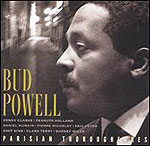
|
|||
|
|||
| Home |
| Gallery |
| Culture/ Technology |
| Fiction |
| Music |
| Poetry |
| Theater |
| What's New |
| About/Contact |
| Archive |
|
Unmistakable mark of genius From the Summer 2003 issue.
Back in the beginning, there was bebop, and Bud Powell was there with his piano. Okay, bebop – birthed in the mid-forties, with midwives Charlie Parker and Dizzy Gillespie and Thelonious Monk and Bud Powell in attendance – may not have been the beginning. But bebop changed things, and laid a foundation for much of the jazz we listen to today. It should be noted that the sides on "Parisian Thoroughfares" – as well as those on "Paris Sessions," last year's Pablo Records offering of unissued Powell music – was recorded after the pianist's late '40s prime, when he was cutting his classic sides with drummer Max Roach and trumpeter Fats Navarro, songs like "Bouncin' with Bud," "Tempis Fugit," "Celia" and "I'll Keep Loving You." But it's also worth noting that the piano man was still capable of excellence. His work on Dexter Gordon's "Our Man in Paris" – an inarguable classic – was recorded in '63, four years after most of these sides were laid down. Having said that, "Parisian Thoroughfares" does have a rather roughhewn feel to it. Charmingly so. Recorded live – except for "Omicron" – at various locales in Paris (Powell was doing the expatriate thing), these aren't the tight, seamless three-minute masterpieces of Powell's heyday. The sound mixes are occasionally sketchy, with some shaky tempos and a false note here and there. And for all that, Powell's brilliance – in a raw form, to be sure – shines through. Especially interesting are the numbers recorded with horns. It's fascinating to hear tenorists Zoot Sims and Barney Willen (on "Omicron," "Buzzy," "No Problem" and "Miguel's Party") and trumpeters Clark Terry and Peanuts Holland (on "Buzzy" and "No Problem") wrestle with Powell's unpredictabilities. At this point in his life, the pianist communicated with his music, exclusively. Powell's well-documented mental decline – aided by a police beating – was at the stage where there were no pre-gig conversations to discuss arrangement, keys, tempos. Powell simply didn't talk. So his bandmates had to adjust. The resulting sounds are loose and elastic, a bit unpredictable, but with the unmistakable mark of genius – and indispensible for Powell fans. Review by Dan McClenaghan. Dan is a writer living in Oceanside, Calif. Read his biography on his AllAboutJazz.com page. |
Copyright © Turbula.net

